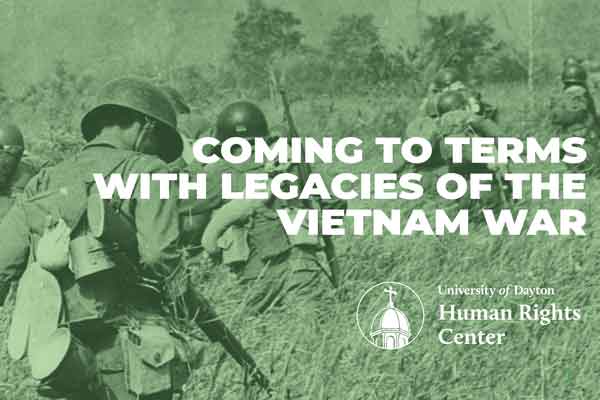News

Report: Vietnam War-era policies underlie polarization, violence, militarization of today's society
Vietnam War-era policies underlie much of the militarization of today's society as well as political and social polarization and violence, according to a University of Dayton Human Rights Center report to be released May 27.
"America’s war in Vietnam ended 50 years ago, but the legacies of that conflict remain potent," the report "Coming to Terms with Legacies of the Vietnam War" contends. "The premise underpinning this report is that where war legacies are not adequately addressed by governments, civil society, and other stakeholders, societies are more likely to repeat mistakes and perpetuate injustice and conflict," the authors wrote.
The 60-page report takes stock of U.S. efforts to address the legacies of war in Southeast Asia and advise what remains to be done. It also spotlights advocates embodying the diverse and devastating impacts of the war, and ongoing efforts to mitigate those effects. The report seeks to reach policymakers, humanitarian and advocacy organizations, and other stakeholders with a series of policy recommendations.
Click here for the complete report. Key findings include:
- Societal transformation - The Vietnam War accelerated the militarization of U.S. society. Militarized societies are those in which the tactics, organizations, equipment and anxieties characteristic of armed conflict infiltrate everyday life. Specific tactical and organizational changes initiated in the 1960s brought police departments closer to military units. These include transfers of military equipment to domestic law enforcement, the creation of elite SWAT units, and the use of military terms to describe police operations ("war on drugs," for example). Returning African American veterans helped defend Black communities from state violence and white supremacist threats. Militia groups and anti-government extremists have used the symbols of the war in Southeast Asia to recruit members, especially veterans, and build support for "taking back" the U.S. government from perceived domestic enemies, with consequences seen in the Jan. 6 riot at the U.S. Capitol. Polarization in domestic affairs and failure to manage these at home also distracts the U.S. from dealing effectively with foreign issues, weakening our influence and competitiveness abroad, especially in China and Southeast Asia.
- Accountability and reparations - Images of U.S. soldiers committing war crimes and other violations are an iconic legacy of the conflict. The effects of the U.S. use of Agent Orange and unexploded ordnance remain formidable for many Vietnamese, Lao and Cambodians as well as for children of Vietnam vets. Congressional action has brought the U.S. closer to upholding international norms and funding for clean-up and support for impacted veterans and communities. However, the pressures of domestic politics continue to threaten acceptance of and adherence to global norms. Since the Vietnam War ended, the wars in Iraq and Afghanistan have tested U.S. commitment to accountability for violations of international and domestic laws by U.S. soldiers and contractors. Moreover, more needs to be done to provide redress for those living with long-term debilitating impacts.
- Reconciliation and healing - Acknowledging past wrongdoing promotes healing, but politics present a significant barrier. Despite the evidence of wrongdoing in the Vietnam conflict, the United States never has acknowledged its responsibility. In addition to avoiding responsibility for the war itself, apologies from the U.S. to veterans of the war on both sides as well as citizens of Vietnam have been slow. Veterans and advocates have sought to fill the gap by making amends for the war through humanitarian initiatives. While recognition of the trauma and injury of war on individuals is now more widespread, particularly for those who serve, less has been done to encourage healing from the broader effects of war on American society.
- Truth-telling and memorialization - Societies cannot move beyond conflict without frankly confronting the past. Exercises in truth-telling advance justice by providing closure to the victims of war, fostering reflection among perpetrators of wrongdoing, and dispelling wartime lies and propaganda. Without structured forums for truth-telling, much of the narrative of the Vietnam conflict has centered on the complex and often tragic experiences of white, male American military veterans, leaving out African American, female and Vietnamese, Lao and Cambodian perspectives. Greater recognition of the gendered dimensions of the conflict, the Vietnamese American refugee experience, the effects of peace activism and the links to the civil rights movement are needed in museum exhibits and historical lessons. Acknowledging such hidden histories in the classroom and broader culture is crucial for establishing a shared and comprehensive understanding of war legacies and promoting peace. Expanding standard narratives to reflect racial, gender and political diversity should continue in education and popular culture, particularly as a means of combating enduring racial and other biases and inequities.
Shelley Inglis, UD Human Rights Center executive director, and Paul Morrow, post-doctoral fellow in the center, wrote the report with financial support from UD alumnus and Vietnam veteran John (Jack) Meagher. The report emerged from a scholar-practitioner symposium and feedback from Vietnamese groups in Dayton and the Stimson Center’s War Legacies Working Group; particularly Roots of Peace, Legacies of War, PeaceTrees Vietnam, the War Legacies Project, Project RENEW, the Center for International Stabilization and Recovery at James Madison University, and the United States Institute of Peace.
Inglis will present findings as part of a Stimson Center virtual event at 9 a.m. ET May 27, timed to accommodate audiences in Southeast Asia and in advance of Memorial Day in the United States. Inglis joins a panel with George Black, who wrote The New York Times article "The Victims of Agent Orange the U.S. Has Never Acknowledged"; Tammy Baldwin, U.S. senator from Wisconsin; Khamphan Anlavan, ambassador from Lao People’s Democratic Republic to the U.S.; Susan Hammond, a daughter of a Vietnam veteran who has helped chart the enduring impacts of Agent Orange; and Sera Koulabdara, executive director of Legacies of War. Register here.
For more interviews, contact Shawn Robinson, associate director of news and communications, at srobinson1@udayton.edu or 937-232-2907.
